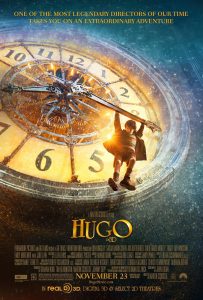
(Sight & Sound, BFI)
This review reveals important plot points. In Martin Scorsese’s 3D family film, Hugo’s title character is an orphan boy, living in the hidden spaces of a fantastically stylised Paris circa 1930. For the film’s first half, the story seems to be shaping into a mystery-adventure thriller, which may or may not involve actual magic. In the second half, though, another character in Hugo turns out to be a real (and legendary) figure from the dawn of film. From that point on, Hugo becomes a colourfully-garnished history lesson about the figure in question, and an ode to silent cinema. It’s a well-meant trick on Scorsese’s part, and a novel way of promoting early film history to a multiplex audience. It’s also a fundamentally dishonest lure.
Hugo is certainly a vivid concoction, beginning with an epic swoop into and through the bustling, smoke-wreathed Montparnasse station. Here, Hugo (Asa Butterfield from The Boy in the Striped Pyjamas) climbs through cogs and scaffolding like a boy Quasimodo (though Hugo has no deformity and is a rather well-scrubbed outcast). As in many children’s films, the grown-up world is an overbearing threat. There’s a bumbling but remorseless station inspector (Sacha Boron-Cohen) who snatches kids and banishes them to the orphanage; a nasty toyshop seller (Ben Kingsley) who threatens to burn Hugo’s treasured notebook; and the impersonal station crowds who indifferently trample children underfoot (the film’s scariest moment).
Hugo’s sole companion is a child-sized clockwork doll, found by his late father (Jude Law), which Hugo is sure holds some secret if he can find the key. Meanwhile, he spies on the station regulars going about their routines, impeded in their different ways. Baron-Cohen’s inspector longs to court a pretty flower-seller (Emily Mortimer) but is stymied by his artificial leg, its squeaks proclaiming his emasculation. Hugo himself becomes friends with Isabel, the toymaker’s book-loving god-daughter (played by Chloe Moretz from Kick-Ass and Let Me In). The boy introduces her to his smoky world, and also to the silent films he loves.
Up to this point, we have every reason to expect Hugo and Isabel will be central to some grand adventure. The fiery demise of Hugo’s father (Jude Law), shown in flashback, appears to be murder, while the mysterious automaton could be from an Indiana Jones yarn. But the grand revelation, when it comes in the middle of the film, isn’t really about Hugo at all. Rather, it’s that Kingsley’s grumpy toy-maker used to be a pioneering film director, Georges Méliès (1861-1938), who fired a rocket into the moon’s eye in A Trip to the Moon (1902).
Isabel and Hugo are demoted from the heroes of their story to awestruck students of Méliès, as the film fills up with illustrated lectures and loving reconstructions of Méliès’ fabulous career. (There’s a sublime trompe l’oeil moment when we realise we’re viewing a submarine world in Méliès’s 1903 film Kingdom of the Fairies through – what else? – a fishtank filmed in close-up.) The children’s “adventure” amounts to reminding a genius of his own genius, with makeshift perils for Hugo tacked on in the last reel. The airy resonances between Hugo’s and Méliès’s stories within the film never convince; and while Hugo can certainly be seen as a cipher for Scorsese, and Hugo as a metaphor for the cinephile outsider, all this does nothing to alleviate the film’s prosaic shortcomings as a story.
There is much pleasure to be had from Hugo’s performers, who continually make its melodrama and sentiment real, especially Kingsley as Méliès, playing the director-magician in the throes of a deep grief that the script never articulates. There are vibrant colours and camera placings, gorgeously immersive 3D, and an extraordinary (though indulgent) sequence in which a runaway train ploughs through the length of Montparnasse. Hugo’s deceptive story may introduce far more people to Méliès than any biopic or documentary, but this makes it no less a cheat. Many times, Hugo’s characters invoke cinema’s magic and wonder; a pity that Hugo’s broken-backed narrative is such thin self-reflecting glitter.
[amazon_link asins=’B01DWEH4W2,B0064YOKR0′ template=’ProductGrid’ store=’anime04c-21′ marketplace=’UK’ link_id=’d83c1332-eb7f-4284-a306-909d2d03f91f’]